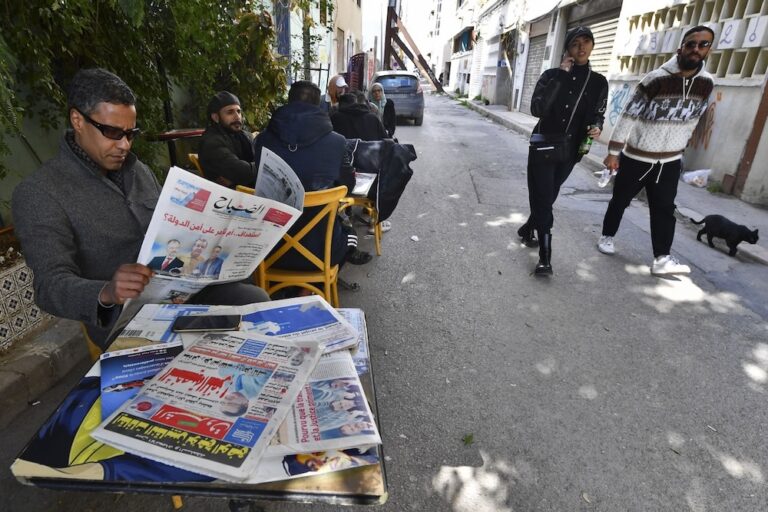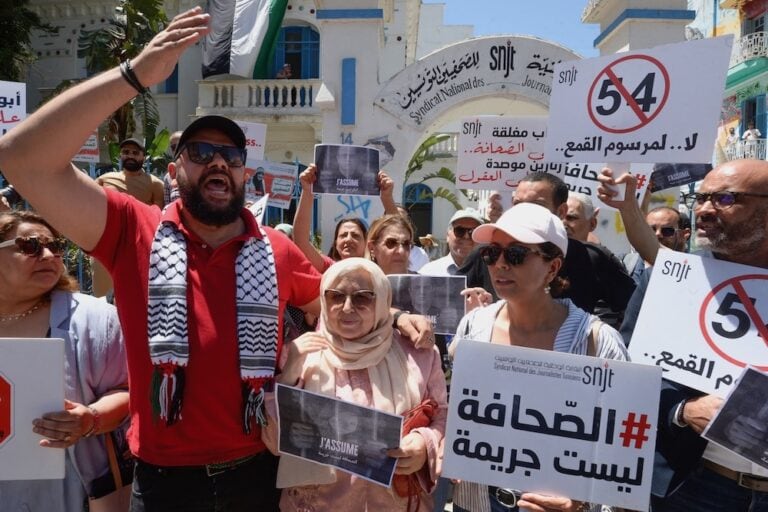(CIHRS//IFEX) – The following is an 8 February 2009 joint action by the Cairo Institute for Human Rights Studies (CIHRS), Arab Archives Institute (AAI), Arabic Network for Human Rights Information (ANHRI), Bahrain Center for Human Rights (BCHR), Maharat Foundation and 17 other organizations: Without Accountability . . . The Tunisian Government Continues to Suppress Human […]
(CIHRS//IFEX) – The following is an 8 February 2009 joint action by the Cairo Institute for Human Rights Studies (CIHRS), Arab Archives Institute (AAI), Arabic Network for Human Rights Information (ANHRI), Bahrain Center for Human Rights (BCHR), Maharat Foundation and 17 other organizations:
Without Accountability . . . The Tunisian Government Continues to Suppress Human Rights
We, the undersigned human rights organizations from the Arab region express our deep condemnation of the accelerating harassments and intimidations targeting journalists and human rights defenders and activists in Tunisia. Such practices reveal the Tunisian authorities’ entrenched animosity towards the right to freedom of expression as well as their general disrespect for human rights organizations and defenders. As such, the Tunisian authorities are becoming dangerous to the physical and moral integrity and safety of independent human rights activists and journalists in the country. Moreover, the Tunisian “dependent” judiciary is being used to legally and politically suppress various forms of protests and social mobility in the country.
The undersigned organizations condemn the unfair sentences issued by the criminal directorate at the Court of Appeal in Qafsa against 38 defendants, including syndicate members and human rights activists, who supported the protests in the mines area last year. The sentences range from one to 10 years of imprisonment. The said trial suffered several shortcomings, including extracting confessions from the defendants under torture. Even though the court was informed of such inhumane and degrading violations, it refused to refer victims for medical examination. It also refused to hear the testimonies of witnesses presented by the defendants. Furthermore, security forces denied the public the right to attend the trial, rendering it more of a secret trial.
The undersigned organizations also express their condemnation of the attacks by the security forces on, and the closure of, the headquarters of the new radio station Kalima. On January 30, 2009 the Tunisian authorities raided the said radio station three days after its official transmission on the European Hot Bird Satellite on January 27. Authorities also confiscated its equipment. This incident came as a part of a wide range of violations against the broadcast team, the station’s guests, as well as a number of human rights defenders. It was furthermore reported that security forces denied the broadcast team access to the station’s headquarters. They also arbitrarily detained the radio presenter, Dafer Otari, for several hours during which time he was repeatedly threatened with being jailed. Moreover, Omar El-Mestiri, the director of the radio station and a human rights defender, was attacked and received death threats before an administrative ruling was passed that prevents him from leaving the country. Security forces have also prevented the station’s guests from entering the station’s headquarters and attacked human rights activist Zoheir Makhlouf upon trying to enter the headquarters of the National Council for Freedoms located in the same building as the headquarters of Kalima. Furthermore, a number of human rights activists were prevented from gathering anywhere near the radio station. It is also worth noting that the Tunisian authorities have, for a long time, tainted the good name and reputation of the Tunisian human rights activist and Kalima’s editor-in-chief, Seham Ben Sedrin, in the various state-run media channels in Tunisia as well as in some Arab newspapers. Ben Sedrin received a complaint from the public prosecutor for allegedly conducting media activities without license. Authorities have furthermore blocked all land lines and mobile communication lines of all Kalima staff.
We, the undersigned organizations, express our solidarity with all human rights activists and those denied the right to freedom of expression in Tunisia. We call upon the Tunisian government to suspend its ruling to close down the Kalima radio station and to stop all types of intimidation, so that it will be possible to realize free and independent journalism in the country. The Tunisian authorities are also called upon to liberate independent newspapers and radio stations from the hegemony of governmental censorship as well as to grant them the legal license that ensures freedom of publication and transmission of news. The government is also urged to lift the sustained raid on the headquarters of many human rights organizations and to grant the human rights defenders freedom of work, movement and association. This should be done in accordance with Tunisia’s human rights pledges and with respect to the international standards included in the human rights conventions as acknowledged and ratified by the Tunisian state, including the principles protected by the Universal Declaration of Human Rights and the International Covenant for Civil and Political Rights.
The undersigned organizations furthermore demand the suspension of all sentences against the defendants involved in the mining area incidents and emphasize the need to take necessary measures to ensure the independence of the judiciary in Tunisia and to put an end to its manipulation according to the interests of the executive authority.
Finally, the undersigned rights organizations call upon the Special Rapporteur on Freedom of Expression, the Special Representative of the UN Secretary-General on the Situation of Human Rights Defenders, the Special Rapporteur on Human Rights Defenders in Africa and the Special Rapporteur on the Independence of Judges and Lawyers to immediately intervene in order to pressure the Tunisian government to immediately cease such acts and conform to its international legal obligations towards the enhancement of human rights in Tunisia, in accordance with international human rights conventions and treaties.
Signatory Organizations:
1. Andalus Institute for Tolerance and Antiviolence Studies (Egypt)
2. Arab Archives Institute (Jordan)
3. Bahrain Center for Human Rights
4. Bahrain Youth Society for Human Rights
5. Cairo Institute for Human Rights Studies
6. Center for the Defense of Media and Press Freedoms in the Middle East (Lebanon)
7. Committee for Bahrain’s Martyrs and Victims of Torture
8. Committees for the Defence of Democracy Freedoms and Human Rights (Syria)
9. Damascus Center for Human Rights Studies
10. Group for Democratic Development (Egypt)
11. Hesham Mubarak Law Center (Egypt)
12. Land Center for Human Rights (Egypt)
13. Maharat Foundation (Lebanon)
14. New Women Research Center (Egypt)
15. Palestinian Center for Development and Media Freedoms
16. The Arab Organization for Human Rights (Syria)
17. The Arabic Network for Human Rights Information (Egypt)
18. The Coordinating Committee for Syndicates’ and Workers Unions’ Rights and Freedoms (Egypt)
19. The Egyptian Association for Community Participation Enhancement
20. The Egyptian Initiative for Personal Rights
21. The Syrian Center for Media and Freedom of Speech
22. Women’s Petition Committee (Bahrain)
For further information on the 2008 protests in the Gafsa mines area, check the Tunisia section in CIHRS’s annual report for 2008: http://www.cihrs.org/Images/ArticleFiles/Original/382.pdf
For further information on charges brought against a journalist for covering the 2008 protests, see: http://ifex.org/en/content/view/full/99494


